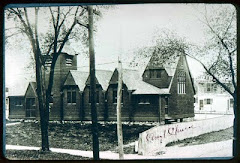A while back I got fed up with all the junk on my home computer. I suspect I had several viruses, and needed to do something about the “infection”. Programs were slowing down, and I was getting lots of “error” messages. Scandisk wasn’t working. It was a mess. So I backed up my important files, and did a radical restore function, returning my PC to the mint condition it was in when I first bought it several years ago. I got a fresh start.
I thought how we all could use such a refreshing reboot. In a way, we do so through confession and the reassurance of God’s forgiveness. Ideally, we could begin every day with such a new beginning. But there’s our cluttered memory, those hidden files, the viruses we hold onto. We put up with the condition of our inner computer far too long before considering something radical...like repentance.
A Christian is not someone who never does wrong. We are instead, models of God’s grace. We’re not sinless, though we try to sin less. When we fall, we get up and (hopefully) learn from the experience; we may even help keep others from stumbling. We admit our failures to God and to ourselves (and maybe also a trusted friend). We go on, with God’s help. When we encounter a system failure, we trust the Lord to clean us up and remove all the “junk” we’ve been accumulating.
The author of Hebrews counsels us to “strip off every weight that slows us down, especially the sin that so easily hinders our progress” (12:1). We fight against sin, which isn’t easy. We are born swimming in polluted waters. Our environment is thoroughly secular and filled with ungodly influences that call to us, enticing us. Non-Christian worldviews clamor for our attention. If we’re not careful, we can easily become infected by false thinking. But then there are the “weights”. These are the things that, while not sinful, can burden us. They impede our progress. They become excess baggage. Like a computer with insufficient memory, we find we can’t handle much more, often because we’re too encumbered with stuff. We may have to carefully appraise what we should delete and send to the recycle bin.
After performing a system analysis (appraising the demands placed on us) we unload the items that are keeping us from being effective. We don’t merely eliminate stuff; we add positive activities that will enrich us. Just like we may want to free memory on your PC by getting rid of some mindless games so you can load some Bible software, we can reprogram our thinking by getting into God’s word and taking time to pray. We can let the System Manager, the Webmaster of our soul maximize our effectiveness in life.
Weekend A La Carte (July 5)
20 hours ago






